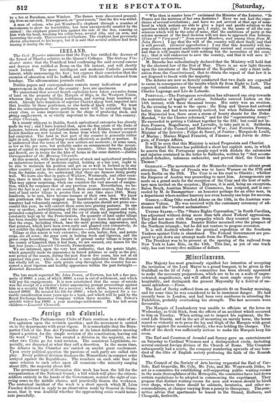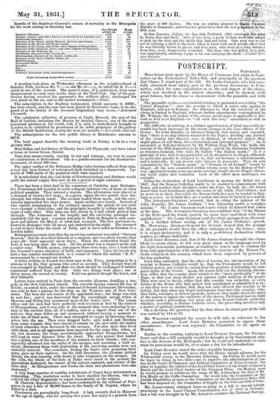3iiortltruttuno.
Her Majesty has most graciously signified her intention of accepting the invitation of the Lord Mayor to a grand banquet, to be given in the Guildhall on the 2d of July. A committee has been already appointed to make the necessary preparations, which are to be on a scale of unpre- cedented, magnificence and will afford the most ample scope for civic- hospitality, and distinguish the present Mayoralty by a festival of un- usual splendour.—Times.
The Earl of Derby suffered from an apoplectic fit on Sunday morning, and for some time he was considered to be in imminent danger. He had recently been in London, and had been very assiduous in attending the Exhibition, probably overtasking his strength. The last accounts were favourable.
The Marquis of Londonderry was unable to officiate at the levee on Wednesday, as Gold Stick, from the effects of an accident which occurred to him on Tuesday. When setting out to inspect his regiment, the Se- cond Life Guards, and in the act of mounting an unruly horse, the horse reared so violently as to press the leg and thigh of the Marquis with great violence against the mounted orderly, who was holding the charger. The effect of the shock was sufficiently serious to make the Marquis keep his MOM.
The Earl and Countess of Arundel and Surrey gave an entertainment on Saturday to Cardinal Wiseman and a distinguished circle, including several eminent foreign divines of the Church of Rome. The Countess subsequently had a soiree, the company numbering upwards of one hun- dred of the elite of English society professing the faith of the Romish. Church.
The Council of the Society of Arts having requested the Earl of Car- lisle, Earl Granville, Mr. Cole, Mr. Peto, and Mr. Wentworth Dilke, to act as a committee for establishing self-supporting public waiting-rooMs in the main thoroughfares of the Metropolis, the committee have laid down certain regulations to be adopted in commencing the expetiment. They propose that distinct waiting-rooms for men and women should be hired over shops, where there should be cabinets, lavatories, and other ac- commodations, at charges varying from a penny to threepence. Thesom- mittee advise that apartments be leased in the Strand, Holborn, and Cheapside, forthwith.
Results of the Registrar-General's return of mortality in the Metropolis for the week ending on Saturday last.
Ten Weeks Week.
of 1841-30. of 1811. Zymotie Diseases 1,819 .... 197 Dropsy, Cancer, and other diseases of uncertain or variable seat 474 .... 34
Tubercular Diseases 1,844 .... 200
Diseases of the Brain, Spinal Marrow, Nerves, and Senses 1,163 .... 121 Diseases of the Heart and Blood-vessels 280 .... 39 Diseases of the Lungs, and of the other Organs of Respiration . 1,063 .... 176 Diseases of the Stomach, Liver, and other Organs of Digestion 560 .... 67 Diseases of the Kidneys, 6r.c 78 .... 11 Childbirth, diseases of the Uterus, etc 92 .... 12 Rheumatism, diseases of the Beam, Joints,itc 64 .... 9 Diseases of the Skin, Cellular Tissue, &c.. 17 .... 4 Malformations Premature Birth 200 .... 42 Atrophy 146 .... 22 Age 481 .... 40 Sudden 104 .... 4 violence, Privation, Cold, and Intemperance 278 .... 14 — — Total (including unspecified causes) 8,724 1,000
A meeting took place on Wednesday afternoon in the neighbourhood of Osterley Park, between Mr. V—n and Mr. G—y, in which Sir R. P-1 acted as one of the seconds. The quarrel arose, it is understood, from some disagreement at cards some weeks since at the Turf Club. One of the gen- tlemen having received his opponent's fire without effect, discharged his own pistol in the air, and so the matter terminated.—Globe.
The subscription to the Rushton testimonial, which amounts to 85001., has been closed, and the sum has been placed in Heywood's bank, to be dis- posed of as the family of the deceased Stipendiary may desire.—Liverpool C•hroniele.
The celebrated collection of pictures at Castle Howard, the seat of the Earl of Carlisle, including the Maries by Annibal Caracci, one of the most renowned pictures in the world, will, it is said, be immediately brought to London to be exhibited by permission of its noble proprietor at the gallery of the British Institution, during the next six months.—Newcastle
The subscriptions for the free public library at Manchester amount to 88751.
The local papers describe the weaving trade at Paisley to be in a very gloomy state.
Miss Sellon and her Sisters of Charity have left Plymouth, and have taken a house at Lower Green, Bristol.
Tiinkiron steam-vessels, varying in size and tonnage, are now in course of construction at Birkenhead. One is a paddle-steamer for the Russian Go- vernment, of about 400 tons.
The upper surface of the Britannia Bridge tubes having suffered from rain, a roof has been formed of waterproof cloth stretched on a framework. Up- wards of 7000 yards of the prepared cloth were required.
It is calculated that the coal-fields of Northumberland and Durham would yield the annual supply they now do for a period of eight centuries.
There has been a fatal duel in the commune of Condette, near Boulogne. Six Frenchmen left London to settle a dispute between two of them on some political question. They entered a warren. The adversaries were placed at at distance of twenty-five steps ; at a given signal the two pistols were dis- charged, but without result. The seconds loaded them again, and the com- batants approached five steps nearer. Again neither was struck. Instead of this contest terminating in the ordinary manner, the pistols (it was said) were charged a third time, and the principals brought to within only fifteen steps of each other. This time one fell, struck by a ball which pierced him through. The witnesses of the tragedy and the surviving principal im- mediately left the spot : a person was sent to Pont de Briques to seek a sur- geon and inform the Mayor of what had occurred. The five survivors re- turned to Boulogne with all speed, and embarked in the night. The deceased is said to have borne the name of Petit, and to have acted as foreman to a London tailor.
Subsequent accounts state that the surviving combatant was called "Georges Rouieel," that he described himself as a surgeon, and was about twenty-four years old : Petit appeared about thirty. When the authorities found the body it was lying upon the back. On the ground was a surgical probe and a rapier cane. Watch, money, and papers there were none, save a book with the deceased's name and place of birth, and a passport. Upon his breast was laid a fine cambric handkerchief, in a corner of which the initials " R. B." .siumounted by a coronet are worked. A letter written in French has been sent to the Times, purporting to be a stateme-it by the four persons who acted as seconds. They declare that all was arranged in England, and that two shots should be exchanged if neither combatant suffered from the first. Only two firings took place ; one at thirty paces, the second at twenty. Petit was pierced though the heart, and died instantly.
Letters have arrived in Paris from the corvette Alcmene, detailing a tra- gedy in the New Caledonia islands. The corvette having entered the bay of Balade, an armed boat, under the command of Second Lieutenant Deveresme, was sent to find a passage for the ship on the Western side of New Cale- donia. The boat did not return at the appointed time ; the barge was sent to seek her ; and it was discovered that the exceedingly savage tribes of Menema and Bellep had massacred most of the boat's crew. " The young officer and his men had been perfectly well received at first by the natives of Hienguebune, and it was only at the moment they were preparing to re- turn to the corvette that, all of a sudden, and at a signal from one of the natives, they were fallen on and . massacred, without having a moment to make use of their arms. Three men attempted to escape by throwing them- selves into the sea. They were dragged -back ; and, naked and bleeding from many wounds, they were forced to remain on the spot while the bodies of their comrades were devoured by the savages. For nine days they lived with them, and to all appearance were reserved for the same fate, when, at the last moment, the barge providentially approached Hienguebune, but still kept at some distance from the shore. The only person that landed was a priest, one of the members of the mission in these islands ; who cou- rageously advanced into the midst of the-savages, and assuming a bold at- titude, threatened them with destruction if the surviving seamen were not instantly restored. The cannibals, finding. the boat's crew preparing their aims, gave up their captives. On the 15th December, the Alcmene quitted Balade, the men burning with desire to take vengeance on the savages. On the 17th, the whole of the huts at Tulao were razed to the ground, the plantations destroyed, the canoes of the natives captured, and twenty of the tribe shot. At Hienguebune and Pauba the huts and plantations were also destroyed."
A very large number of wealthy inhabitants of Cassel have determined on emigrating. This resolution seems to have startled the Elector, who has ordered the Chief Magistrate to report immediately on the subject. M. Chavoix, Representative, has been condemned by the tribunal of Peri- gneux to pay a fine of 30,000 francs to the family of M. Dupont, whom he killed in a dueL Pensioners are proverbially long-lived. A Indy recently died in Hanover at the age of eighty, who for seventy-five years has enjoyed a pension from the state of 400 thalers. She was an orphan adopted by Matilda of Denmark ; and when her protectress died she was pe to her . fifth year.
At San Lorenzo, Callao, the flag-ship Portland, (50,) exerc o. by firing shot and shell. After it was over, a party of men we sialere., to pick up the shot and the shells that had not burst. One man was in the '" act of carrying a shell to the boat, when it burst with such terrific effect that he was literally blown to pieces, and four men, who were at a long distance from him, were dangerously wounded. The man who was killed, it is said, was imprudently smoking a pipe as he was carrying the shell.—United Ser- vice Gazette.



























 Previous page
Previous page